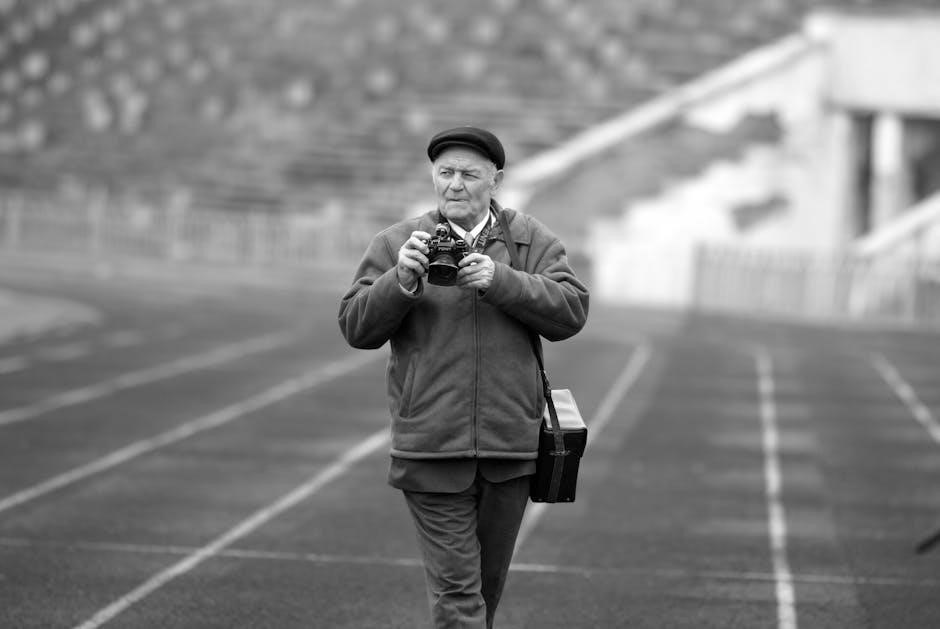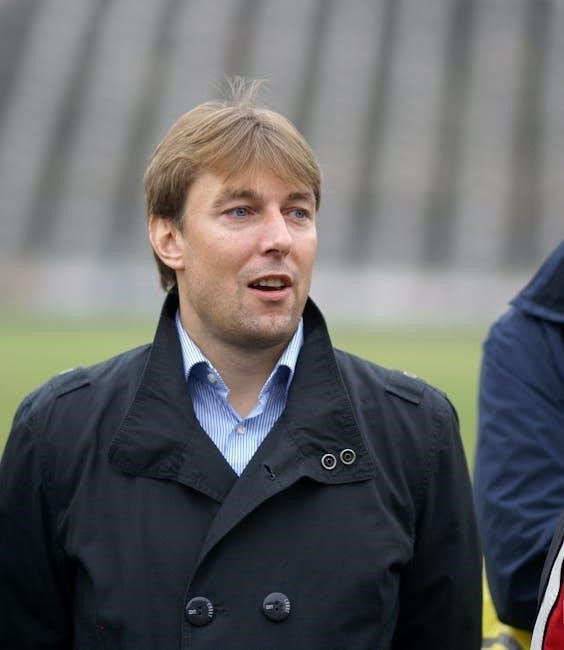Deacon training in the Black Church equips servant-leaders through structured programs and mentorship, focusing on biblical principles, church harmony, and community service, vital for effective ministry.
Overview of Deacon Training
Deacon training in the Black Church combines formal instruction and hands-on experience, focusing on biblical teachings, leadership development, and community service. Programs often include structured manuals, workshops, and mentorship, ensuring deacons understand their roles as servant-leaders. Topics range from biblical qualifications to conflict resolution, equipping deacons to support church governance and foster harmony. This holistic approach prepares individuals to serve effectively, addressing spiritual, emotional, and practical needs within the congregation and broader community.
Importance of Deacon Training in the Black Church
Deacon training is vital for fostering effective servant-leadership, ensuring deacons are equipped to address spiritual and practical needs within the congregation. It emphasizes biblical principles, promoting harmony and accountability. By preparing deacons to resolve conflicts and support church governance, training strengthens the church’s foundation. Historically, deacons have played a pivotal role in sustaining Black Church communities, making their training essential for continuing this legacy of service and leadership. Empowered deacons contribute to the church’s mission and its impact on the community.

Biblical Foundations of Deacon Training
Deacon training traces its roots to Acts 6:1-7, where servants were chosen to care for the needy, reflecting biblical principles of service and leadership.
What the Bible Says About Deacons
The Bible outlines deacons as faithful servants, chosen for their integrity and ability to serve. In Philippians 1:1 and 1 Timothy 3:8-13, deacons are described as humble, truthful, and dedicated leaders, responsible for caring for the church’s needs and maintaining harmony. Acts 6:1-7 highlights their role in serving the marginalized, emphasizing their commitment to justice and compassion. These biblical teachings form the cornerstone of deacon training, guiding their spiritual and practical responsibilities.
The Office of the Deacon in 1 Timothy 3
1 Timothy 3:8-13 outlines the qualifications and roles of deacons, emphasizing their moral integrity, humility, and faithfulness. Deacons must be honest, self-controlled, and dedicated to their families and the church. The passage highlights their role in serving others and maintaining church order, ensuring they are examples of Christ-like character. These biblical standards guide deacon training, focusing on spiritual maturity and practical service within the Black Church, enabling deacons to effectively support the congregation and uphold God’s Word.
Acts 6:1-7 and the Origin of Deacon Ministry
Acts 6:1-7 describes the appointment of the first deacons in the early church, chosen to address the neglect of Grecian widows. The apostles, overwhelmed by the growing church, entrusted seven men to oversee practical needs, freeing them to focus on spiritual leadership. This passage establishes the deacon’s role as servants, ensuring equity and care for all members. It serves as the biblical foundation for deacon ministry, emphasizing compassion, fairness, and dedication to serving others, which remains central to deacon training in the Black Church today.

Historical Context of Deacon Training in the Black Church
Deacon training in the Black Church traces its roots to early Christian practices, emphasizing servant-leadership and community support, with a focus on spiritual growth and practical ministry.
Deacons in the Historic Black Baptist Church
Deacons in the historic Black Baptist Church have long served as vital leaders, tracing their origins to early Christian servant-leadership models. Their role evolved to address community needs, emphasizing spiritual guidance, conflict resolution, and support for the poor. Historical records highlight their significance in maintaining church harmony and promoting unity. The office of the deacon in Black Baptist traditions has been formalized over time, with training focusing on biblical principles and practical ministry. Their contributions remain central to the church’s mission and legacy.
Evolution of the Deacon Role in the Black Church
The role of deacons in the Black Church has evolved significantly, expanding from their biblical origins as servants and problem solvers. Historically, deacons addressed community needs, supported the poor, and maintained church harmony. Over time, their responsibilities grew to include leadership, conflict resolution, and spiritual mentorship. The modern era has seen the formalization of deacon training, incorporating biblical principles with practical ministry skills. This evolution reflects the dynamic needs of the congregation, ensuring deacons remain vital to the church’s mission and cultural heritage.
Impact of Historical Events on Deacon Training
Historical events have significantly shaped deacon training in the Black Church, with movements like the Civil Rights Movement emphasizing the role of deacons in community leadership and advocacy. The inclusion of women as deacons in some churches marked a pivotal shift, expanding training to address gender-specific ministries. These events underscored the need for deacons to adapt to societal changes while remaining rooted in biblical principles, fostering a more inclusive and dynamic approach to servant-leadership within the church.
Qualifications and Spiritual Requirements for Deacons
Deacons must meet biblical standards of faithfulness, integrity, and humility, demonstrating spiritual maturity and a commitment to serving the church through sacrificial love and steadfast devotion.
Biblical Qualifications for Deacons
The Bible outlines specific qualifications for deacons in 1 Timothy 3, emphasizing traits such as being blameless, the husband of one wife, temperate, and hospitable. They must be faithful stewards of God’s Word and have a good testimony among believers. Acts 6:1-7 highlights the selection of deacons who were full of the Holy Spirit and wisdom, demonstrating their ability to serve the church effectively. These biblical standards ensure that deacons are spiritually mature and capable of fulfilling their roles with integrity and compassion in the Black Church.
Spiritual and Character Requirements
Spiritual maturity and strong character are essential for deacons, as they serve as role models in the church. They must demonstrate a deep commitment to faith, prayer, and the teachings of Christ; Key traits include humility, integrity, and a willingness to serve others. Deacons should be self-controlled, honest, and free from immoral behavior. Their reputation in the community should reflect godliness and trustworthiness. These qualities ensure that deacons can lead with compassion, wisdom, and a genuine heart for ministry, fostering a positive impact within the Black Church.
Testing and Ordination Processes
The ordination of deacons in the Black Church involves a rigorous process of spiritual evaluation and testing. Candidates undergo a period of assessment to ensure they meet biblical qualifications and demonstrate a genuine call to ministry. Churches often require potential deacons to complete training programs and undergo interviews with church leaders. Once approved, they are ordained through a formal ceremony, symbolizing their commitment to serve. This process ensures that deacons are spiritually prepared and equipped to fulfill their roles effectively within the church community.

Structure of Deacon Training Programs
Structured programs often combine formal training, such as classes and seminars, with informal mentorship and hands-on experience. The curriculum typically covers biblical teachings, leadership skills, and community service, ensuring deacons are well-prepared for their roles.
Formal Training Programs
Formal training programs for deacons in the Black Church often include structured classes, seminars, and workshops. These programs cover biblical qualifications, church governance, and practical ministries. Many churches provide annual training sessions, ensuring deacons stay updated on their roles. The curriculum may also address conflict resolution, ethical decision-making, and community outreach; Some programs require deacons to develop individualized service plans, fostering personal growth and accountability. These formalized approaches ensure deacons are well-equipped to serve effectively, blending spiritual guidance with practical skills for ministry.
Informal Mentorship and On-the-Job Learning
Informal mentorship and on-the-job learning are vital in deacon training within the Black Church. Experienced deacons often guide newcomers, sharing wisdom and practical skills. This approach allows deacons to learn through hands-on experience, addressing real-world challenges. Many churches emphasize the importance of mentorship, pairing seasoned leaders with trainees to foster spiritual growth and ministry effectiveness. This method ensures deacons are prepared to serve their communities compassionately and effectively, blending tradition with contemporary needs.
Curriculum and Key Topics Covered
The curriculum for deacon training in the Black Church emphasizes biblical teachings, practical ministry skills, and leadership development. Key topics include biblical qualifications for deacons, church governance, and community service. Training also covers conflict resolution, ethical decision-making, and the historical role of deacons in the Black Church. Additionally, lessons on servant-leadership, mentorship, and spiritual growth are integral. The curriculum ensures deacons are well-prepared to address modern challenges while upholding tradition and fostering church harmony.

The Role of Deacons in the Black Church
Deacons serve as spiritual leaders, problem solvers, and promoters of church harmony, supporting the pastor and congregation while maintaining unity and fostering a spirit of cooperation.
Responsibilities and Duties of Deacons
Deacons are entrusted with serving the church community, fostering harmony, and addressing member needs. Their duties include supporting the pastor, managing church affairs, and promoting unity. They serve as problem solvers, mediating conflicts and ensuring peace within the congregation. Deacons also assist in spiritual ministries, such as visiting the sick and comforting the bereaved. Additionally, they oversee financial and logistical matters, ensuring resources are used effectively. Their role is rooted in faithfulness, integrity, and a commitment to serving God and the church.
Deacons as Servant-Leaders
Deacons exemplify servant-leadership by prioritizing the needs of the congregation and community. They emulate biblical models, such as Phoebe, who demonstrated compassion and dedication. Through active listening, empathy, and humility, deacons foster a spirit of unity and cooperation. Their leadership is characterized by a commitment to justice and equality, reflecting the teachings of Christ. By serving with integrity and love, deacons inspire others to follow their example, strengthening the church’s mission and witness.
Women Deacons in the Black Church
Women deacons in the Black Church play a vital role, often drawing inspiration from biblical figures like Phoebe. Their ministries emphasize compassion, leadership, and community service. Despite historical debates, many churches now affirm women’s ordination, recognizing their gifts. Training programs increasingly include women, fostering equity and inclusivity. Women deacons serve as role models, embodying the church’s commitment to empowerment and shared leadership, enriching the congregation’s spiritual life and fostering unity in Christ.

Church Leadership and Deacon Ministry
Deacons collaborate with church leaders to foster harmony and unity, supporting the congregation’s spiritual growth while addressing practical needs and conflicts, ensuring effective ministry.
Deacons and Church Governance
Deacons play a pivotal role in church governance, supporting the pastor and congregation in decision-making. They oversee administrative tasks, manage resources, and ensure the smooth operation of ministries. Deacons also address conflicts and mediate disputes, fostering unity within the church. Their leadership is guided by biblical principles, ensuring that the church remains aligned with its mission and values. By serving as problem solvers and promoters of harmony, deacons are essential to effective church governance and the spiritual well-being of the congregation.
Deacons’ Relationship with the Pastor and Congregation
Deacons serve as liaisons between the pastor and congregation, ensuring open communication and addressing spiritual needs. They support the pastor in leadership while maintaining a strong connection with the congregation. Deacons foster unity by resolving conflicts and promoting harmony, acting as servants of the church. Their role requires mutual respect and trust, fostering collaboration and shared responsibility in fulfilling the church’s mission and upholding its values effectively.
Conflict Resolution and Mediation
Deacons play a vital role in resolving conflicts within the church, mediating disputes, and fostering harmony. Their training equips them with skills to address issues biblically, ensuring peace and unity. By serving as impartial mediators, deacons help maintain relationships and guide the congregation toward resolution. Effective conflict resolution strengthens the church community, reflecting Christ-like servant-leadership and promoting a spirit of cooperation among members.
Case Studies and Examples
Historical examples highlight pioneering deacons like Reverend Yvonne Clarke, the first Black female deacon in the Church of England, while modern success stories reveal impactful ministries and lessons learned.
Historical Examples of Effective Deacon Ministry
Historical examples of effective deacon ministry highlight the transformative impact of servant-leadership. Reverend Yvonne Clarke, the first Black female deacon in the Church of England, exemplifies breaking barriers and inspiring others. Similarly, the origins of deacon ministry in Acts 6:1-7 demonstrate how early deacons like Stephen and Philip served the poor and spread the gospel, setting a foundation for modern deacon roles. These historical narratives illustrate the evolution of deacon ministry, emphasizing faithfulness, compassion, and dedication to the church and community.
Modern-Day Success Stories
Modern-day success stories highlight the impactful ministry of deacons in the Black Church. Reverend Yvonne Clarke, the first Black female deacon in the Church of England, exemplifies breaking barriers and inspiring others. Similarly, a deacon from the African Methodist Church in New Orleans demonstrates dedication to serving the community. These contemporary examples showcase how deacons continue to embrace their roles as servant-leaders, fostering church growth and addressing societal needs with faithfulness and compassion, reflecting the timeless essence of deacon ministry.
Lessons Learned from Challenging Situations
Challenging situations in deacon ministry highlight the importance of conflict resolution and adaptability. Reverend Yvonne Clarke’s experience with parish dissolution underscores the need for resilience and advocacy. Additionally, addressing crises like church conflicts requires deacons to prioritize harmony and communication. These experiences teach the value of proactive problem-solving, spiritual grounding, and maintaining integrity. They also emphasize the importance of training in ethical decision-making and fostering unity amid adversity, ensuring deacons remain effective servant-leaders in their communities.

Resources for Deacon Training
Key resources include deacon training manuals, such as the Deacon Training Manual and Deacon Training in the African American Church, offering structured guidance and biblical insights for effective ministry.
Recommended Manuals and Guides
Essential resources include the Deacon Training Manual and Deacon Training in the African American Church, providing comprehensive guides for deacons. These manuals cover biblical qualifications, practical responsibilities, and spiritual growth. They offer structured learning approaches, ensuring deacons are well-equipped for ministry. Authors like Eric A. Mayes provide invaluable insights, blending biblical teachings with real-world applications. These guides are indispensable for both new and experienced deacons, fostering a deeper understanding of their role in the Black Church. They emphasize faithfulness, service, and ethical decision-making, equipping leaders for effective ministry.
Online Courses and Workshops
Online courses and workshops provide accessible and structured learning opportunities for deacons. These resources offer interactive lessons, video teachings, and downloadable materials. Many programs focus on biblical teachings, practical ministry skills, and leadership development. Platforms like Ezekiel Ajibade’s e-Library and specific church websites host these resources. Workshops often include sessions on conflict resolution, ethical decision-making, and community engagement. They cater to both individual and group learning, ensuring deacons are well-prepared to serve effectively in their roles within the Black Church community.
Books and Study Materials
Books and study materials are essential resources for deacon training, offering in-depth insights into biblical teachings, leadership, and ministry. Titles like Deacon Training in the African American Church by Eric A. Mayes provide comprehensive guidance. These materials cover qualifications, duties, and historical contexts, ensuring a well-rounded understanding. Study guides and workbooks, such as those by Ezekiel Ajibade, focus on practical application, equipping deacons with the tools needed to serve effectively. These resources are invaluable for both individual study and group training within the Black Church tradition.
Networking and Support Systems
Conferences, retreats, and mentorship programs foster fellowship and resource sharing among deacons, strengthening their ministries through collective wisdom and shared experiences.
Deacon Conferences and Retreats
Deacon conferences and retreats provide opportunities for fellowship, resource sharing, and spiritual growth. These events often feature workshops, guest speakers, and team-building activities designed to enhance leadership skills and deepen biblical understanding. They serve as platforms for deacons to network, share challenges, and gain insights into effective ministry practices. Retreats also offer a space for reflection and renewal, equipping deacons to return to their churches with renewed vigor and innovative approaches to serve their communities more effectively.
Mentorship Programs
Mentorship programs are a cornerstone of deacon training, pairing experienced deacons with newcomers to foster spiritual growth and practical wisdom. These programs emphasize hands-on learning, allowing deacons to navigate challenges under guidance. They also promote a culture of accountability, ensuring that deacons remain rooted in their faith while serving effectively. Mentorship fosters unity and strengthens the deacon ministry, equipping individuals to lead with integrity and compassion in their congregations.
Peer Support Networks
Peer support networks provide deacons with a platform to share experiences, challenges, and insights, fostering mutual encouragement and growth. These networks allow deacons to collaborate, solving problems collectively and enhancing their ministry effectiveness. They also offer access to resources, training materials, and spiritual guidance. By promoting unity and teamwork, peer support networks strengthen deacons’ ability to serve their congregations faithfully. Such systems are vital for sustaining morale and ensuring deacons remain equipped to meet the evolving needs of their communities.
Challenges and Controversies
Deacon training faces challenges like theological debates, conflict resolution, and adapting to modern societal changes, requiring balance between tradition and innovation in servant-leadership roles.
Contemporary Issues in Deacon Training
Modern deacon training faces challenges such as adapting to cultural shifts, balancing traditional roles with contemporary needs, and addressing theological debates. Training programs must now incorporate conflict resolution, ethical decision-making, and community engagement. The rise of online resources and diverse church demographics also require updated approaches. Additionally, the increasing role of women in deacon ministries and the integration of technology in training materials are key contemporary issues shaping deacon training in the Black Church today.
Theological Debates Surrounding Deacon Ministry
Theological debates often center on the role of deacons, their scriptural authority, and gender inclusion. Some argue for a literal interpretation of 1 Timothy 3, excluding women, while others support Phoebe’s example from Romans 16:1. Additionally, debates arise over deacons’ authority in church governance versus their primary role as servants. These discussions reflect broader theological tensions between tradition and modern values, shaping the evolution of deacon ministry in the Black Church and its alignment with biblical teachings.
Addressing Challenges in Modern Churches
Modern churches face challenges like declining membership, cultural shifts, and technological advancements. Deacon training must adapt to address these issues, emphasizing relevance and engagement. Conflict resolution skills are critical as churches navigate internal disputes and societal pressures. Training programs now incorporate diverse perspectives to foster inclusivity and address gender roles, ensuring deacons are equipped to lead effectively in evolving environments while maintaining biblical integrity and community connection.
Deacon training in the Black Church is vital for fostering servant-leadership, ensuring continuity of faith, and addressing modern challenges with integrity and compassion, guiding future ministry effectively.
Summarizing the Importance of Deacon Training
Deacon training is crucial for equipping leaders with biblical principles, fostering servant-leadership, and maintaining church harmony. It ensures deacons are prepared to serve effectively, addressing spiritual and community needs. By emphasizing qualifications, responsibilities, and ethical conduct, training strengthens the church’s foundation. It also promotes unity and resolves conflicts, ensuring deacons can support pastors and congregation effectively. Effective training empowers deacons to fulfill their roles faithfully, contributing to the church’s growth and mission in meaningful ways, both historically and in modern contexts.
Looking Ahead: The Future of Deacon Ministry
The future of deacon ministry lies in adapting training to contemporary needs while preserving biblical foundations. As churches evolve, deacons must embrace technology and diverse methodologies to reach younger generations. Expanding roles for women deacons and fostering inclusive leadership will strengthen ministries. Training programs must address modern challenges, such as cultural shifts and societal issues, ensuring deacons remain relevant and effective. By blending tradition with innovation, the deacon ministry will continue to thrive, serving as a vital pillar in the Black Church’s mission and community engagement.
